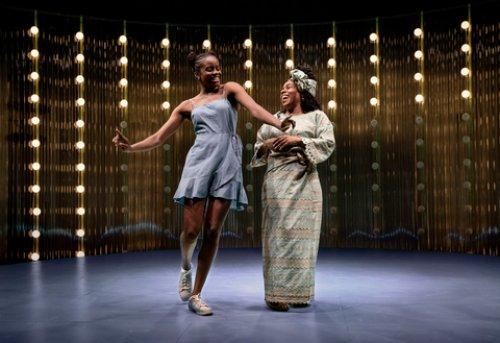If Pretty Hurts Ugly Must Be a Muhfucka
A young woman’s beauty incites jealousy in this Nigerian fable unevenly adapted for the stage. It’s dynamically presented and sensationally performed.

Níkẹ Uche Kadri and Maechi Aharanwa in a scene from Tori Sampson’s “If Pretty Hurts Ugly Must Be a Muhfucka” at Playwrights Horizons (Photo credit: Joan Marcus)
[avatar user=”Darryl Reilly” size=”96″ align=”left” ] Darryl Reilly, Critic[/avatar]Dynamically presented and sensationally performed, If Pretty Hurts Ugly Must Be a Muhfucka is playwright Tori Sampson’s maddeningly overblown adaptation of a fable with music. A surfeit of extraneous devices and a heavy-handed agenda overwhelm and drag out a tender and potentially resonant tale. There’s repetitive jokiness, a lumbering ghostly gospel sequence and an anti-climactic pretentious finale. Amidst the frustrating tangents are bright spots during a straight through nearly two hours.
“Of the Pretty Girl and the Seven Jealous Women” is If Pretty Hurts Ugly Must Be a Muhfucka’s source material. It is contained in Elphinstone Dayrell’s collection Folk Stories from Southern Nigeria that was published in 1910. Ms. Sampson retains many of its characters and overall plot but her narrative embellishments yield mixed results and is driven by a beauty myth concern that’s clumsily dramatized.
In the village of Ibibio, we meet the lovely and pleasant 17-year-old Akim. She is an only child and her poor parents are overprotective. Akim’s friends are jealous of her beauty and contrive to have her drown in a mystical river. Her father is later able to miraculously retrieve her, and soon he kills the seven conspirators.

Antoinette Crowe-Legacy and Leland Fowler in a scene from Tori Sampson’s “If Pretty Hurts Ugly Must Be a Muhfucka” at Playwrights Horizons (Photo credit: Joan Marcus)
Ms. Sampson’s treatment is generally faithful. There’s an added chorus/comedian but gone is a magical bird, there are now only three jealous women and a boyfriend of one is added for Akim to get close to. The nature of the river is altered, and others drown in it. The mean girls are not murdered. It’s all promising material for the stage. However, the clunky structure undermines it.
Níkẹ Uche Kadri is quite captivating as Akim. Inciting audience participation and exhibiting the requisite charisma of the likes of the M.C. in Cabaret or Pippin’s Leading Player is the wonderfully energetic Rotimi Agbabiaka as the Chorus. Maechi Aharanwa and Jason Bowen are both delightful as the parents. Antoinette Crowe-Legacy, Mirirai Sithole and Phumzile Sitole all have their moments of glory as the malicious trio. Leland Fowler is boyishly charming as the romantic interest. Carla R. Stewart powerfully performs a spiritual number and serves as The Voice of the River.
Director Leah C. Gardiner’s staging is vigorous and visually stimulating. Raja Feather Kelly’s mostly pleasing choreography is lively and includes a neat dream ballet but in the gospel scene is oddly simplistic and underwhelming. The cast are in shimmering black robes, wearing white masks and white gloves and it’s awkwardly rendered.

Maechi Aharanwa, Phumzile Sitole, Jason Brown, Níkẹ Uche Kadri, Rotimi Agbabiaka and Leland Fowler in a scene from Tori Sampson’s “If Pretty Hurts Ugly Must Be a Muhfucka” at Playwrights Horizons (Photo credit: Joan Marcus)
Scenic designer Louisa Thompson’s minimalist circular playing area has a clever descending floor panel to represent the eerie river. It’s all framed by vertical configurations of stage lights that lighting designer Matt Frey utilizes for great effects. (However, those who are sensitive to brightness may experience discomfort.) Composer Ian Scot’s rousing exotic original score is terrifically enhanced by live musicians Rona Siddiqui and Erikka Walsh. Mr. Scott’s revved up sound design suits the material well. Costume designer Dede M. Ayite’s bold ensembles have native authenticity.
At the core of If Pretty Hurts Ugly Must Be a Muhfucka is its enchanting tale that’s been waylaid by authorial excesses.
If Pretty Hurts Ugly Must Be a Muhfucka (extended through April 5, 2019)
Mainstage Theater at Playwrights Horizons, 416 West 42nd Street, in Manhattan
For tickets, call 212-279-4200 or visit http://www.playwrightshorizons.org
Running time: one hour and 50 minutes with no intermission






Leave a comment